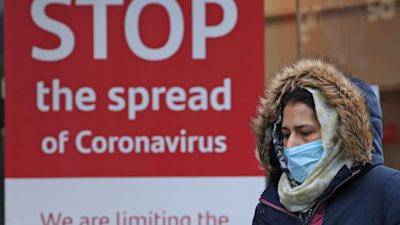Covid: UK's Omicron cases will rise warns health minister, so are we expecting more restrictions?

The number of Omicron coronavirus infections is expected to rocket in the UK, despite the government tightening Covid-19 measures in a bid to slow the worrying new variant's spread.
But ministers are resisting pressure from experts and opposition parties to impose stricter measures - known as the government's Covid 'Plan B' - until more is known about the impact Omicron could have on vaccines and immunity.
Face masks will once again become mandatory in shops from Tuesday and international arrivals will be subject to increased testing, with the government saying it "acted swiftly" to protect Britons against the B.1.1.529 variant.
It also slammed the door shut on arrivals from a number of southern African countries, where the variant was first discovered, in a bid to stop a mass importation of the mutation.
Despite this, nine cases have already been identified in the UK and ministers expect that number to rise.
"We will see, I'm afraid, these case numbers rise," health minister Ed Argar told ITV News, "but what we're doing is taking measures to slow the spread and the seeding of this new variant to give us the time to understand whether it is or not more dangerous and resistant to the vaccine".
Are we expecting more restrictions?
Critics of the government's strategy say stricter measures should be brought in now, to reduce the risk of needing more restrictions at Christmas.
A tightening of measures would likely see the government impose its 'Plan B', which could mean a widening of the settings in which face masks are requires, introducing mandatory vaccine-only Covid-status certification to enter venues and asking people to work from home.
But Mr Argar said there is "no plan to move to Plan B at the moment", adding ministers "believe we've struck the right balance with this".
Health minister: 'Omicron cases will rise...'
"They are proportionate measures to help slow down - we can't stop this new variant but we can slow it down - to give us that time, and we think that we've struck the right balance."
Labour wants mask wearing to be made compulsory in all indoor settings, extending the rule to venues such as pubs and restaurants rather than just shops.
Deputy Labour leader Angela Rayner said Prime Minister Boris Johnson has “undermined” the importance of wearing one by appearing publicly unmasked on several occasions, as she urged him to widen the mask rule.
“We think we should be encouraging people to wear masks when we’re all mixing indoors, as much as possible," she said.
“The prime minister unfortunately has undermined those messages in recent weeks, but wearing a mask can be a very protective way of supporting people in stopping the virus being able to spread as quickly.”
Mr Argar said he was not anticipating that coronavirus restrictions would be tightened further in the run up to Christmas.
He told Sky News he was "looking forward to a Christmas spent with family and friends".
Asked if the government might tighten up the rules even further in the next three weeks, Mr Argar said: "It's not something I'm anticipating."
What about vaccines?
The government is hoping it can avoid a tightening of measures by continuing with its vaccination scheme, with the booster jab programme being extended to younger age groups.
The deputy chair of the Joint Committee on Vaccination and Immunisation, Professor Anthony Harnden, said accelerating the booster programme by extending the eligible age range and reducing the interval between the second and booster doses “will be a sensible strategy”.
The health secretary said he is expecting to get advice on expanding the booster programme from the Joint Committee on Vaccination and Immunisation “imminently".
A decision is expected to be announced on Monday afternoon, at the same time as an urgent meeting is held of health ministers from the G7 group of nations to discuss the new Omicron variant.
“This is all about acting swiftly in a proportionate and balanced way to protect the progress that we have made,” Sajid Javid said.
Professor Greg Towers, from the Division of Infection and Immunity at University College London, said that it was expected that vaccines will still work against the Omicron variant.
“The expectation is the vaccines will still work and the question is, do they work as well or a little bit less well?" he told Times Radio.
“And the vaccine companies want to know if they’re going to have to make a new vaccine using this new spike protein from the Omicron, which is relatively straightforward to do and they’ll do that if it’s less effective.”
Speaking over the weekend, Mr Javid said: vaccines were "our first form of defence" and jabs were now more important “than it was before”.
“We know that vaccines work. Yes, this new variant may make it less effective or not. But the vaccines work, they are our first form of defence and that is why I have also asked our expert advisers on vaccines called JCVI to give me very quick advice on broadening boosting our booster programme," he told Trevor Phillips On Sunday on Sky News.